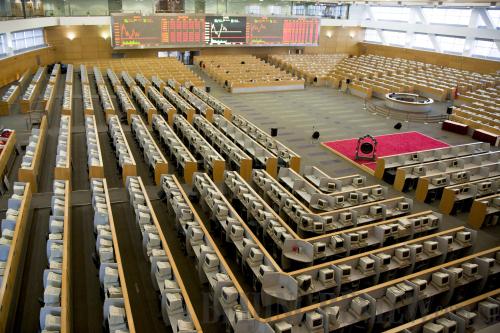|
 |
|
MARKET IMPROVEMENT: The transaction hall of the Shanghai Stock Exchange. China will further improve its capital market (CFP) |
Bai Yuwei, an investment consultant of Great Wall Securities, said, "Reducing A-share transaction fees will directly benefit securities companies and listed companies, and the benefits to individual investors will be indirect."
According to Bai, reducing transaction fees will directly lower costs of securities companies and listed companies. Considering competition factors, securities companies may reduce commission fees upon individual investors in the future.
May 2 was the first trading day after China's May Day holiday, and stock prices in the A-share market were on the rise. The Shanghai Stock Exchange Composite Index rose by 1.76 percent and the Shenzhen Stock Exchange Component Index rose by 2.4 percent. However, almost all the 141 ST stocks in the A-share market touched the decline limit. Obviously, the new policy has imposed a largely positive impact on the market.
Deng Yuwen, senior editor of Study Times, a newspaper that researches China's reform and social transformation, said the securities watchdog issued a series of new policies that emphasized protecting the capital market by the government. More importantly, the new policies also involve changes to the basic mechanism of the stock market, with milestone significance to the improvement of the overall market system.
The Chinese stock market has been declining for nearly five years after hitting a record high in October 2007. Although stock indices rose in 2009, revitalized by the 4-trillion yuan ($633.91 billion) stimulus package and relaxed monetary policy, performance of China's A-share market in the last five years is the world's poorest, contrary to the fast-growing Chinese economy in the same period.
Deng attributed the sluggish Chinese A-share market to various ailments—pessimistic expectations on the economic situation and the number of stocks among them—but the most important and unavoidable reason is systematic defects in the stock market. In the government-led A-share market, problems involved in new stock issuance, dividends of listed companies, exit system and information disclosure have adversely affected investors' confidence and restricted the role of the capital market that should have played in facilitating Chinese economic development and restructuring.
According to Deng, among these new policies, reforming the stock issuance system and improving exit standards are critical to the market's sound development. Among the various cruxes in the A-share market, listing and exiting are the core deciding factors that determine whether the capital market is sound or fluid. The problems of "high issuance price, high price-earnings rate and high oversubscription" for new stock issuance, as well as existence of a large number of ST companies, are the results of the phenomenon of easy listing and hard exiting. These problems have not only damaged the sound development of the stock market, but also directly damaged the interests of investors, especially individual investors.
"Only by thoroughly reforming the stock market can we obtain sound development of the capital market and ensure investors get reasonable returns," Deng said.
Xie Jijun, Managing Director of Investment Banking at China Merchants Securities, wrote in his blog that besides technical reforms, China's capital market also needs some fundamental systematic changes to ensure investors' interest and promote sound development of the market. These changes include establishing a class action system for investors, prohibiting reverse mergers, adopting an exit system, establishing a special supervision system on oversubscribed funds, regulating the time interval of refinancing by listed companies and changing their habit of stressing financing at the cost of neglecting dividends.
Hu Jizhi, President of Guosen Securities Co. Ltd., said starting from 1992 when SZSE was established, China's capital market is now 20 years old. In the first decade, reasons for the existence of the capital market were figured out; in the second decade, development of the capital market was incorporated into state strategies, and some basic problems, such as split share structure reform and comprehensive regulation of securities companies, were solved; and the third decade beginning this year will be an important period to improve China's capital market.
Hu said at present China's capital market does face many urgent problems, including some complicated ones. Among them, whether China can get through the passage connecting the capital market and the real economy will be the biggest task.
| 